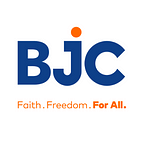A Summer to Remember
By BJC Executive Director Amanda Tyler
I believe we will look back on the summer of 2020 as a pivotal turning point for our country and for our protection of faith freedom for all. Labor Day weekend — the unofficial end of summer — provides an opportunity to review and reflect on this season like no other.
Here’s what I will remember:
Global uprisings against racism and white supremacy urge change in the culture at large, including in religious life. The civil rights movement of our time started on Memorial Day weekend, and it continues in the streets of our country and around the world. Never in my lifetime have we seen this kind of sustained, national attention on the racist systems that persist as a lasting impact of our country’s original sin of slavery. Grief and trauma have been laid bare in the streets after the police killings of so many Black people, including George Floyd and Breonna Taylor, and the shooting of Jacob Blake. Institutions and individuals are grappling with their own complicity with racial injustice and white supremacy. I reflected on my personal work to do, as well as the current work of BJC to learn our past, to listen to the experiences of others, and to take actions of reparation. As part of our ongoing work, BJC hosted a national conversation on white supremacy and American Christianity on June 26 with Robert P. Jones, author of the remarkable new book White Too Long, and journalist Adelle Banks.
This image:
President Trump’s photo op with a Bible in front of St. John’s Church on Lafayette Square, from which peaceful protesters had just been cleared by force, was an egregious example of Christian nationalism that inspired immediate criticism from many religious leaders, including me. Fortunately, thousands of Christians are standing up for values that embrace religious freedom for all, warning that “conflating religious authority with political authority is idolatrous and often leads to oppression of minority and other marginalized groups as well as the spiritual impoverishment of religion.” I’m grateful for BJC’s role in the Christians Against Christian Nationalism campaign, which provides a platform for Christians to take a stand, sharing resources to help raise awareness of Christian nationalism and appreciation for religious freedom for all.
The COVID-19 pandemic uproots nearly every facet of our daily lives and provides opportunity for unity. The grim milestones reached this summer — at least 180,000 deaths and more than 6 million cases of this novel coronavirus in the United States — show the severity of this public health crisis. Grief touches every person, whether it be from loss of life, health, employment, opportunity, connection, or just the “normalcy” of life as we know it. Religious life has also experienced drastic changes, with churches faced with decisions about whether to worship remotely or in person and — in all cases — in a different way than before. BJC has tracked the novel legal issues and inspiring stories of how people of faith responded. Life for BJC also looks different these days, with our staff and interns working remotely and the production of a first-ever virtual national luncheon broadcast event this summer. On a personal level, our family experienced a rite of passage — my son’s first day of kindergarten — in an unexpected way as we began a virtual school year this week. Now nearly six months from the time the World Health Organization declared a pandemic, our interdependence, unity and care for one another is crucial.
A blockbuster term in the U.S. Supreme Court provides an uncertain future about the protection of key religious freedom principles. By the time the Supreme Court completed its term in July, it had decided four cases with implications for religious freedom: ruling that employment discrimination protections based on sex also protect against discrimination based on sexual orientation and gender identity (Bostock v. Clayton County); defining in more detail the “ministerial exception” that exempts certain employees of religious institutions from Title VII and other protections against employment discrimination (Our Lady of Guadalupe School v. Morrissey-Berru); holding that the Trump administration had the authority under the Affordable Care Act to issue broader exemptions to the contraceptive mandate (Trump v. Pennsylvania); and ruling that if a state funds private education, it must extend that funding to private religious education as well (Espinoza vs. Montana Department of Revenue). BJC General Counsel Holly Hollman and I were able to talk about each of these cases at length on our weekly series “Respecting Religion” on the BJC Podcast. The way these rulings will work together and change church-state law remains to be seen, but we are likely to look back at this term as one that shifted the Court’s interpretation of the First Amendment’s religion clauses in fundamental ways.
The presidential election season kicked off in a most unusual way. After a sudden end to a crowded and contentious Democratic primary, we had several months without much campaign activity due to the coronavirus. In August, both the Democratic and Republican parties held their national conventions in new virtual and socially distanced manners, without delegates packing large convention halls. Religion and religious themes were explored at both conventions, including in some problematic ways that invoked Christian nationalism. Over the next two months, we’ll see what role religion plays in the race as well as the impact that the pandemic has on the campaign trail and election.
This was not a year of “summer vacation,” but rather a critical season in our shared life. When I look back at the summer of 2020, I am both inspired to take action and more than a little weary. But, most of all, I am grateful for the dedicated and resilient BJC team and for our broad community of faithful supporters who, in the midst of great change and upheaval, remain committed to the importance of faith freedom for all.
Amanda Tyler is Executive Director of BJC
